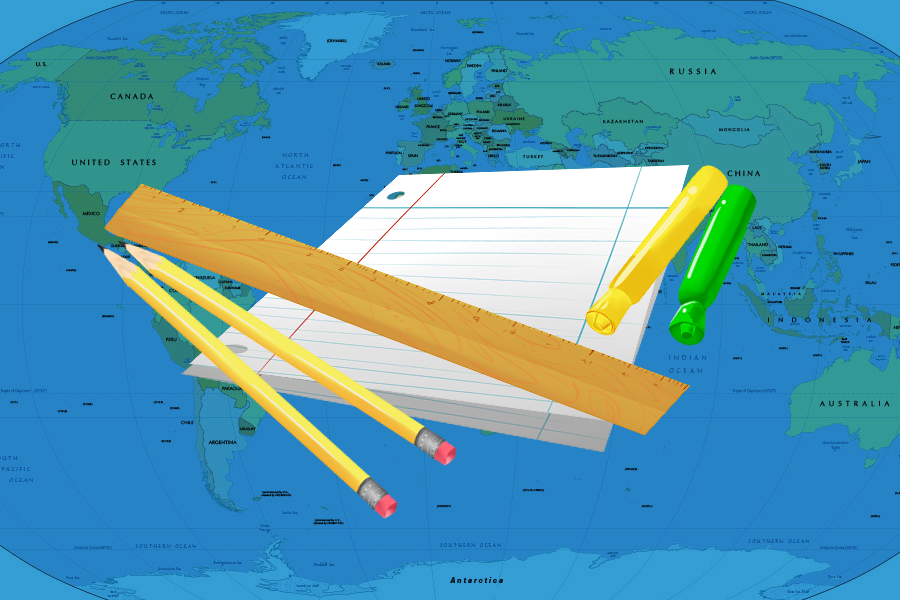
A nonprofit organization working toward sustainability
There are hundreds if not thousands of charities and nonprofits that work toward helping developing countries by sending aid money and materials its inhabitants may need. It makes people wonder why there are still so many prevailing issues in third-world countries, when there seem to be millions of dollars and lots of aid going into building up these countries. There is a new nonprofit in town that may have an answer to that question.
Academics Without Borders USA (AWB-USA) is a nearly-three-year-old nonprofit organization with strong ties to UC Davis. Their primary goal is to “increase the capacity of colleges and universities in developing nations” to shape the engineers, doctors and teachers that these countries so desperately need in order to face their problems. AWB-USA sends trained academics and experts in their respective fields to universities and institutes all around the world to “teach the teachers.”
AWB is unique in its proposal process. Rather than taking suggestions for projects from professionals here in the United States, the nonprofit has a year-long cycle in which they take proposals from the foreign institutes they assist. When the board decides which projects they are going to fund, they either connect the institute with the experts they need or build on established relationships between foreign institutes and academics that they have already been in contact with.
One of AWB’s recent projects was in Sri Lanka at the University of Peradeniya. Dr. Michael Wilkes had already been involved at the institute, traveling back and forth over the course of a couple of years. Last year, AWB got involved by providing grant money to fund travel expenses for Wilkes and for Patricia Conrad, a professor in the Veterinarian Medicine Department at UC Davis as well as the rest of their team. While Sri Lanka has come a long way from the war-torn third-world country it was at the beginning of the century, problems have continued to come up in the 21st century. Chronic kidney disease, rabies, malaria, Dengue fever and environmental issues with conservation and agricultural impacts are all serious issues the small island country is still facing. Wilkes and Conrad looked to address these problems by helping the future leaders of the country — the students and faculty at the University of Peradeniya — learn how to solve problems together and be leaders. They taught the One Health research approach used at Davis, focusing on collaboration between different fields.
“There’s a lot of overlap between all these schools: veterinary sciences, medicine, nurses and doctors,” Wilkes said. “They learn a lot of the same things. So by teaching these students and faculty how to learn and collaborate, we can get a lot more done.”
A second program in Haiti was also funded by AWB this past year. Dr. Anthony Phillips and Dr. Douglas Gross had already been in contact with the Hôpital de l’Université d’Etat d’Haïti (HUEH), visiting a few times before AWB started funding their efforts. In developing countries, medical experts are often given general training without any specialty or subspecialties due to their lack of resources or even lack of knowledge. Imagine having a general surgeon perform cardiac surgery, or an OB specialist forced to perform spinal surgery. Phillips and Gross addressed this problem by bringing a new subspecialist with them on each visit to help the students, faculty and residents at the HUEH learn how to deal with more specific health issues. On their most recent trip, they brought with them Dr. Jong Hee Chung, a hematologist. Sickle-cell anemia is a huge issue in Haiti, and teaching doctors how to treat blood-related diseases will go a long way in making the country more healthy.
“It’s not good enough to visit and just leave them with a bottle of pills that will run out within a month. We try to make sure everything we teach them is sustainable,” Phillips said.
Sustainability lies at the heart of AWB and all of its projects. The typical AWB grant for travel expenses is around $5,000, which is paltry in comparison to the millions donated by the Red Cross or even the Gates Foundation. But all of these experts are aware that what these developing countries and people need is training, resources of knowledge and experience.
“We’re pretty frugal,” said Bob Agee, the chairman of AWB. “We don’t fund buildings; we don’t fund equipment. It all goes into getting an expert there for enough time to make a difference. We have a high cost-benefit ratio. We’re proud of that.”
What makes AWB unique is the “people” approach. As Agee stresses, the core of the nonprofit is “people who know people.” There is already enough money going into these countries, but that money and aid only provide short-term solutions. For a country to change and for problems to be fixed, real change has to come from among the people themselves. Sending experienced academics and experts abroad to teach willing professionals who only lack resources and training seems like a new, effective model to aid countries in need.
Written by: Ahash Francis — city@theaggie.org



